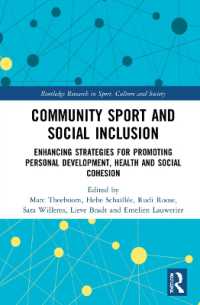Full Description
This book offers a historically sweeping yet detailed view of world-systemic migration as a racialized process. Since the early expansion of the world-system, the movement of people has been its central process. Not only have managers of capital moved to direct profitable expansion; they have also forced, cajoled or encouraged workers to move in order to extract, grow, refi ne, manufacture and transport materials and commodities. The book offers historical cases that show that migration introduces and deepens racial dominance in all zones of the world-system. This often forces indigenous and imported slaves or bonded labor to extract, process and move raw materials. Yet it also often creates a contradiction between capital's need to direct labor to where it enables profitability, and the desires of large sections of dominant populations to keep subordinate people of color marginalized and separate. Case studies reveal how core states are concurrently users and blockers of migrant labor. Key examples are Mexican migrants in the United States, both historically and in contemporary society. The United States even promotes of an image of a society that welcomes the immigrant—while policy realities often quite different. Nonetheless, the volume ends with a vision of a future whereby communities from below, both activists and people simply following their communal interests, can come together to create a society that overcomes racism. Its final chapter is a hopeful call by Immanuel Wallerstein for people to make small changes that, together, can bring real about real, revolutionary change.
Contents
Introduction
Part I. Long duree
Immigration as racial dominance since 1492
Migration, Resource Frontiers, and Extractive Peripheries: Toward a Typology
Operationalizing the resource frontier: Russian Fur Hunting and Racialized Migration in the Aleutian Islands
Part II. Migration in the US
The First Large Wave of Mexican Migration to the US: Rail Construction and Maintenance's Contribution to World-System Development, 1890-1929
The Deportability Regime: From Bad to Worse in Central Texas under Obama and Trump
Heritage, Belonging, and Active Citizenship in the United States: a Role Model for the EU?
Part III. World migrations today
Partition-Induced Migrations: How Migration Has (Re)shaped Social and Political Identities in Divided States
A Search for Post-Nationalist Imaginaries in 'Bengal': Exploring Ecoethnoscapes (Bioregions with Permeable Boundaries)
Labor migration, agrarian crises and livelihood transformations in the making of a world city: Bangalore in critical perspective
"Going Home is not an Option:" Filipino Domestic Workers in the Middle East
Part IV. Conclusion - the way ahead
Migrations and Their Politics







